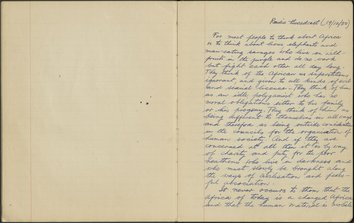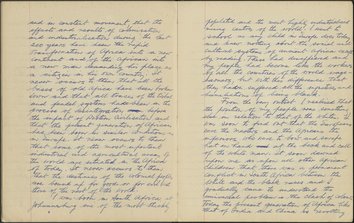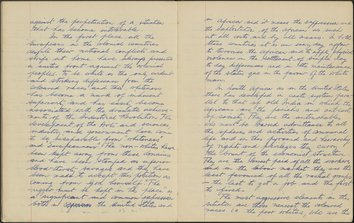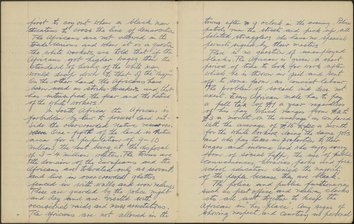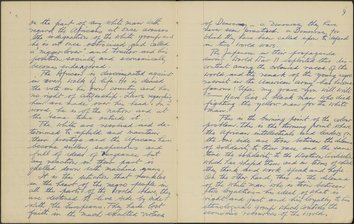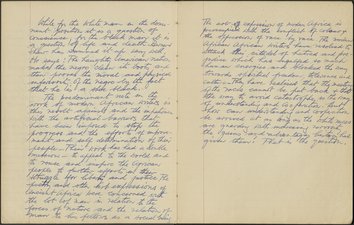Ferlov Mancoba
1950-12-19
Ophavsperson/nøgleperson
Ernest Mancoba
Dokumentindhold
Ernest Mancobas manuskript "Radio Broadcast."
Transskription
Radio Broadcast (19/12/50)
For most people to think about Africa is to think about lions, elephants and man-eating savages who live on wildfruits in the jungle and do no work but fight each other all day long. They think of the African as superstitious ignorant, and given to all kinds of evil and sexual license – They think of him as an idle polygamist who has no moral obligations either to his family or his progeny. They think of him as being different to themselves in all ways and therefore as being outside consideration in the councils for the organization of human society. And if they are concerned at all then it is by way of charity and pity for the poor heathens who live in darkness and who must slowly be brought along the ways of civilization and peaceful association.
It never occurs to them that the Africa of today is a changed Africa and that the human material is mobile and in constant movement, that the effects and results of colonisation and industrialisation during the last 200 years have been the rapid transformation of Africa into a new continent and of the African into a new man demanding his place as a citizen in his own country. It never occurs to them that all the bases of old Africa have been broken down and that all traces of the tribal and feudal systems have been in the process of disintegration even before the impact of Western civilization and that the present generation of Africans has been born in similar conditions as in Europe. It never occurs to them that some of the most important industrial and agricultural areas of the world are situated in the Africa of today. It never occurs to them that the destinies of the colonial people are bound up for good or for evil with those of the rest of the world.
I was born in South Africa at Johannesburg one of the most thickly populated and the most highly industrialised mining centres of the world. I went to school as any child in Europe does today and knew nothing about the social and cultural systems of ancient Africa except by reading. These had disappeared and my people had become like the workers of all the countries of the world wage-earners, but with the difference that they had suffered all the injustices and humiliations of being black.
From the very outset I realised that the position of my people was something else in relation to that of the whites. I was soon to find out that the Europeans were the masters and the Africans the inferiors who were to bow and scrape hat in hand and at the beck and call of the white mand. It soon dawned upon me as upon all other African children that there was a permanent conflict in South Africa between the white and the black races and I gradually came to understand the universal problem – the clash of colour. Today the present generation of Africa like that of India and China is revolting against the perpetuation of a situation that has become intolerable.
In the first place all the Europeans in the colonial countries despite their national conflicts and strife at home have always presented a united front against the colonial peoples. To be white is the only evident and striking difference from the coloured races and this whiteness has become a mark of inherent superiority and has easily become associated with the dramatic achievements of the Industrial Revolution. The development of the Arts and sciences, industry and government have come to be inseparable from “whiteness” and “Europeanness”. The non-whites have been kept away from theses domains and have been stamped as inferior blood-thirsty savages and they have been made to accept this position as coming from God himself. “The nigger must be kept in his place” is a significant and common expression in Africa the United States and in Africa and it means the suppression and the exploitation of the African as such at all costs and by all means. In both these countries it is an everyday affair to terrorise the African and to apply physical violence in the settlement of simple day to day differences and in the maintenance of the status quo in the favour of the white man.
In South Africa as in the United States there has developed a caste system parallel to that of old India in which the Africans are the pariahs and out-casts of society. They are the untouchables who must be barred admittance to all the spheres and activities of communal life and in this pyramid and hierarchy of rights and privileges they carry the brunt of the economic structure. They are the lowest paid of all the workers and in the labour market they are the least favoured of all the racial groups – the last to get a job and the first to fired –
The most aggressive elements in this situation are those nearest the coloured raves ie the poor whites, who are the first to cry out when a black man threatens to cross the line of demarcation. The Africans are not allowed in the trade unions and when it is a question the white workers are told that if the Africans got higher wages then the standard of living of the white man would drop down to that of the “nigger” On the other hand the Africans have been used as strike-breakers and that has intensified the fear and the hatred of the white workers.
In South Africa the African is forbidden by law to possess land outside the overcrowded native reserves. when One-fifth of the land is native area for a population of 9-10 million, the rest being at the disposal of 3-4 million whites. The towns are the domain of the Europeans and the Africans are tolerated only as servants and live in overcrowded ghettos fenced in with walls and iron railings These are guarded by the police night and day and are visited with occasional raids and mass arrestations. The Africans are not allowed in the towns after n 9 o’clock in the evening. Police patrols run the streets and pick up all belated stragglers who have no special permits signed by their masters.
There is no question of unemployed blacks. The African is given a short period of time to look for work after which he is thrown in jail and sent off to some farm as convict labour. The problem of social aid does not exist. Every African male has to pay a poll tax of £1 a year regardless of his pay which ranges from £2 to £3 a month on average as compared with the average of £15 to £20 a month for the white workers doing the same jobs and who pay taxes in proportion to their wages and income and who enjoy every form of social help, the use of public conveniences, libraries, parks and free school education denied the majority of the people because they are black.
The police and public functionaries such as posts office and railway clerks etc all act together to keep the African in “his place”. Any signs of showing respect and courtesy in personal on the part of any white man with regard the Africans at once arouses the indignation of the white group and he is at once ostrocised and called a “niggerlover” and traitor and his position socially and economically becomes endangered.
The African is discriminated against in every walk of life. He is denied the vote in his own country and has no right of citizenship. Laws regarding him are made over his head. In a word, he is of the nation and at the same time outside it.
The whites are resolved and determined to uphold and maintain their prestige and the Africans have become sullen, suspicious and full of ideas of vengeance but any reaction on their part is quelled down with machine guns.
It is this situation that rankles in the heart of the negro people in all the parts of the world where they are destined to live side by side with the Europeans. They have lost faith in the much exalted virtues of Democracy – a Democracy they have never seen practised, a Democracy for which they have been called upon to defend in two world wars.
The Japanese in their propaganda during World War II exploited this discontent among the coloured races of the world and the remark of the young negro recruit in the American army has become famous: Upon my grave you will write – Here lies a black man who died fighting the yellow man for the white man.
This is the burning point of the colour problem. This is the turning point where the African intellectuals and leaders on the one side are torn between the dilemma of solidarity to their race and the same time solidarity to the Western Civilisation which has shaped them and in terms of which they think and work speak and hope. On the other hand, this is the dilemma of the white man who is torn between two loyalties – his ideal of what is right and just and his loyalty to his ethnological group which controls the economic resources of the world.
While for the white man in the dominant position it is a question of conscience, for the black man it is a question of life and death. Bernard Shaw has summed it up very well. He says: The haughty American nation makes the negro clean its boots and then proves the moral and physical inferiority of the negro by the fact that he is a shoe black.
The predominant note in the work of modern African writers is this revolt against and the impatience with the artificial barriers that have been imposed to stop the progress and the efforts of improvement and self determination of their people – Their work has had a double mission – to appeal to the world and to rouse and inspire the African people to further efforts in their struggle for liberty and justice. The poetry and other art expressions of Ancient Africa were concerned with the lot of man in relation to the forces of nature and the relation of man to his fellows as a social being.
The art of expression of modern Africa is preoccupied with the conflict of colour and the oppression of race by race. The modern African African writers have resolved to attack this citadel of hatred and prejudice which has engulfed so much human energies and blocked the way towards spiritual freedom, tolerance and culture – They have realised that the meeting of the races cannot be put back and that the way to avoid catastrophe is the way of understanding and cooperation. But how can understanding and cooperation be arrived at as long as the white races are guarding with increasing nervosity the gains and advantages history has given them? That is the question.
It never occurs to them that the Africa of today is a changed Africa and that the human material is mobile and in constant movement, that the effects and results of colonisation and industrialisation during the last 200 years have been the rapid transformation of Africa into a new continent and of the African into a new man demanding his place as a citizen in his own country. It never occurs to them that all the bases of old Africa have been broken down and that all traces of the tribal and feudal systems have been in the process of disintegration even before the impact of Western civilization and that the present generation of Africans has been born in similar conditions as in Europe. It never occurs to them that some of the most important industrial and agricultural areas of the world are situated in the Africa of today. It never occurs to them that the destinies of the colonial people are bound up for good or for evil with those of the rest of the world.
I was born in South Africa at Johannesburg one of the most thickly populated and the most highly industrialised mining centres of the world. I went to school as any child in Europe does today and knew nothing about the social and cultural systems of ancient Africa except by reading. These had disappeared and my people had become like the workers of all the countries of the world wage-earners, but with the difference that they had suffered all the injustices and humiliations of being black.
From the very outset I realised that the position of my people was something else in relation to that of the whites. I was soon to find out that the Europeans were the masters and the Africans the inferiors who were to bow and scrape hat in hand and at the beck and call of the white mand. It soon dawned upon me as upon all other African children that there was a permanent conflict in South Africa between the white and the black races and I gradually came to understand the universal problem – the clash of colour. Today the present generation of Africa like that of India and China is revolting against the perpetuation of a situation that has become intolerable.
In the first place all the Europeans in the colonial countries despite their national conflicts and strife at home have always presented a united front against the colonial peoples. To be white is the only evident and striking difference from the coloured races and this whiteness has become a mark of inherent superiority and has easily become associated with the dramatic achievements of the Industrial Revolution. The development of the Arts and sciences, industry and government have come to be inseparable from “whiteness” and “Europeanness”. The non-whites have been kept away from theses domains and have been stamped as inferior blood-thirsty savages and they have been made to accept this position as coming from God himself. “The nigger must be kept in his place” is a significant and common expression in Africa the United States and in Africa and it means the suppression and the exploitation of the African as such at all costs and by all means. In both these countries it is an everyday affair to terrorise the African and to apply physical violence in the settlement of simple day to day differences and in the maintenance of the status quo in the favour of the white man.
In South Africa as in the United States there has developed a caste system parallel to that of old India in which the Africans are the pariahs and out-casts of society. They are the untouchables who must be barred admittance to all the spheres and activities of communal life and in this pyramid and hierarchy of rights and privileges they carry the brunt of the economic structure. They are the lowest paid of all the workers and in the labour market they are the least favoured of all the racial groups – the last to get a job and the first to fired –
The most aggressive elements in this situation are those nearest the coloured raves ie the poor whites, who are the first to cry out when a black man threatens to cross the line of demarcation. The Africans are not allowed in the trade unions and when it is a question the white workers are told that if the Africans got higher wages then the standard of living of the white man would drop down to that of the “nigger” On the other hand the Africans have been used as strike-breakers and that has intensified the fear and the hatred of the white workers.
In South Africa the African is forbidden by law to possess land outside the overcrowded native reserves. when One-fifth of the land is native area for a population of 9-10 million, the rest being at the disposal of 3-4 million whites. The towns are the domain of the Europeans and the Africans are tolerated only as servants and live in overcrowded ghettos fenced in with walls and iron railings These are guarded by the police night and day and are visited with occasional raids and mass arrestations. The Africans are not allowed in the towns after n 9 o’clock in the evening. Police patrols run the streets and pick up all belated stragglers who have no special permits signed by their masters.
There is no question of unemployed blacks. The African is given a short period of time to look for work after which he is thrown in jail and sent off to some farm as convict labour. The problem of social aid does not exist. Every African male has to pay a poll tax of £1 a year regardless of his pay which ranges from £2 to £3 a month on average as compared with the average of £15 to £20 a month for the white workers doing the same jobs and who pay taxes in proportion to their wages and income and who enjoy every form of social help, the use of public conveniences, libraries, parks and free school education denied the majority of the people because they are black.
The police and public functionaries such as posts office and railway clerks etc all act together to keep the African in “his place”. Any signs of showing respect and courtesy in personal on the part of any white man with regard the Africans at once arouses the indignation of the white group and he is at once ostrocised and called a “niggerlover” and traitor and his position socially and economically becomes endangered.
The African is discriminated against in every walk of life. He is denied the vote in his own country and has no right of citizenship. Laws regarding him are made over his head. In a word, he is of the nation and at the same time outside it.
The whites are resolved and determined to uphold and maintain their prestige and the Africans have become sullen, suspicious and full of ideas of vengeance but any reaction on their part is quelled down with machine guns.
It is this situation that rankles in the heart of the negro people in all the parts of the world where they are destined to live side by side with the Europeans. They have lost faith in the much exalted virtues of Democracy – a Democracy they have never seen practised, a Democracy for which they have been called upon to defend in two world wars.
The Japanese in their propaganda during World War II exploited this discontent among the coloured races of the world and the remark of the young negro recruit in the American army has become famous: Upon my grave you will write – Here lies a black man who died fighting the yellow man for the white man.
This is the burning point of the colour problem. This is the turning point where the African intellectuals and leaders on the one side are torn between the dilemma of solidarity to their race and the same time solidarity to the Western Civilisation which has shaped them and in terms of which they think and work speak and hope. On the other hand, this is the dilemma of the white man who is torn between two loyalties – his ideal of what is right and just and his loyalty to his ethnological group which controls the economic resources of the world.
While for the white man in the dominant position it is a question of conscience, for the black man it is a question of life and death. Bernard Shaw has summed it up very well. He says: The haughty American nation makes the negro clean its boots and then proves the moral and physical inferiority of the negro by the fact that he is a shoe black.
The predominant note in the work of modern African writers is this revolt against and the impatience with the artificial barriers that have been imposed to stop the progress and the efforts of improvement and self determination of their people – Their work has had a double mission – to appeal to the world and to rouse and inspire the African people to further efforts in their struggle for liberty and justice. The poetry and other art expressions of Ancient Africa were concerned with the lot of man in relation to the forces of nature and the relation of man to his fellows as a social being.
The art of expression of modern Africa is preoccupied with the conflict of colour and the oppression of race by race. The modern African African writers have resolved to attack this citadel of hatred and prejudice which has engulfed so much human energies and blocked the way towards spiritual freedom, tolerance and culture – They have realised that the meeting of the races cannot be put back and that the way to avoid catastrophe is the way of understanding and cooperation. But how can understanding and cooperation be arrived at as long as the white races are guarding with increasing nervosity the gains and advantages history has given them? That is the question.
Fakta
PDF
Manuskript
Engelsk
Dateret i manuskript.
Manuskriptet svarer ord for ord til en tilsvarende tekst på dansk, som Ernest Mancoba læste op i en radioudsendelse på Danmarks Radio. Radioprogrammet hed Afrikas stemme og blev første gang sendt d. 18.12.1950. Tilrettelæggeren var Henning Pade og udover Ernest Mancobas bidrag blev der læst prosa og poesi op med relation til livet i Afrika.
Transkriberet, resumeret og annoteret af Karen Westphal Eriksen.
Transkriberet, resumeret og annoteret af Karen Westphal Eriksen.
George Bernard Shaw
Ferlov Mancoba-arkivet.
